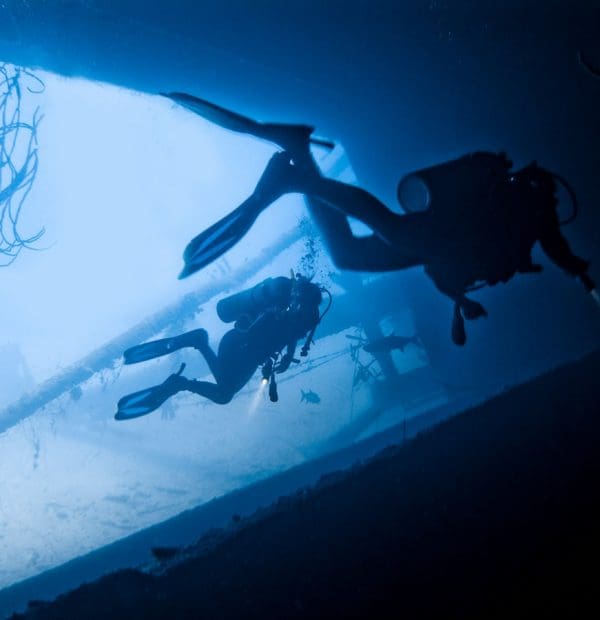Starting an advanced scuba diving certification course can take you to new depths and dimensions of the underwater world. If you have mastered the basics and are looking to expand your skills, achieving higher levels of certification provides the training needed to safely explore more challenging environments and participate in more complex dive activities.
Advanced certifications are not just about going deeper or staying down longer; they’re about broadening your understanding of the aquatic realm and improving your ability to navigate through it.
Whether you’re interested in night diving, wreck exploration or perfecting your buoyancy, advanced training equips you with the necessary skills and knowledge to take your diving experience to new heights. By immersing themselves in these advanced abilities, divers can unlock fresh adventures as well as become more self-assured and capable beneath the waves.
Advanced Open Water Diver
Overview
The Advanced Open Water Diver (AOWD) certification is designed as a progression from the Open Water Diver course by introducing divers to new activities and environments below the surface of water. This certification acts as an exciting first step beyond basic open-water certification allowing for wider penetration into scuba diving world.
Training Requirements
The AOWD course usually involves both knowledge development sections together with practical application sessions where trainees get hands-on experience on what they learnt theoretically. There are typically five adventure dives that have to be completed:
- Deep Diving: This teaches how one should plan for deep dives which are deeper than beginner dive sites’ average depth limits.
- Underwater Navigation: Concentrates on compass usage plus natural navigation methods thus enabling better site orientation during dives.
Adventure Dives
Apart from mandatory deep dive followed by underwater navigation dive there exist other elective adventure dives that candidates can choose from in order to complete their certifications such as:
- Night Diving: Here learners get introduced into peculiar behaviors shown by marine life only after darkness falls.
- Peak Performance Buoyancy: This develops divers’ ability control buoyancy better thereby minimizing their ecological footprint while maximizing fun below the surface.
- Underwater Photography: Divers are taught how they can take pictures of underwater creatures and keep them as souvenirs so that others too may see the beauty in it.
Certification Process
In order to earn this certificate, one must accomplish two required adventure dives alongside three elective ones. During each dive, certain skills will be practiced under close guidance from an instructor who is already certified.
Benefits
With an Advanced Open Water Diver (AOWD) certification you can:
- Access deeper sites; up to 30 meters (100 feet).
- Acquire new skills which increase your versatility while diving thus making it more enjoyable for you.
- Develop greater confidence when dealing with different diving conditions and environments.
This certificate acts like a door opener into specialized activities besides being a stepping stone towards further professional qualifications within scuba industry. It greatly expands where and what type of underwater scenarios any recreational diver can comfortably explore hence should not miss in their list of achievements.
Rescue Diver
Importance
The Rescue Diver certification is widely regarded as one of the most important courses for divers to take due to its significant focus on problem prevention and management. This course is also known for putting great emphasis on self-rescue skills, along with other people’s rescue techniques as well as early recognition plus effective response towards potential dive accidents or incidents that might occur during future dives.
Skills Covered
Rescue Diver training covers all aspects necessary when dealing with minor or major emergencies related to diving through different methodologies such as:
- Self-Rescue: Identifying personal stress levels thereby preventing small issues from growing big.
- Diver Stress and Rescue: Recognizing the stress of other divers, dealing with panic and managing in-water rescue situations.
- Emergency Management: Knowing what to do in case of an emergency including necessary first aid procedures.
Emotional and Practical Benefits
The course of rescuing a diver not only equips them with skills for safeguarding themselves and their peers during dives but also boosts self-assurance levels alongside developing leadership qualities. This is because individuals are taught how to think critically as well as make prompt decisions which are valuable both within or without any aquatic setting.
Course Requirements
In order to take the Rescue Diver course, you must hold an Advanced Open Water Diver certification and a current first aid with CPR qualification (completed within the past 24 months). Typically, this program involves theoretical learning as well as practical application in simulated emergency situations.
Master Scuba Diver
Prestige and Requirements
Often considered the highest recreational diving level, Master Scuba Diver is a widely recognized rating. To earn this rating, you need to finish five PADI specialty courses and have at least 50 logged dives. This award represents your dedication to dive education coupled with experience across a range of underwater activities.
Specialties Involved
The path towards becoming a Master Scuba Diver includes participating in different specialties such as Deep Dive, Wreck Dive, Night Dive, Underwater Navigation or Peak Performance Buoyancy among others (there are many more). Such diversity ensures that divers become knowledgeable in various aspects of scuba diving thus making them well-rounded.
Recognition and Opportunities
Being identified as a Master Scuba Diver presents further possibilities for adventure, leadership or even professional development within the diving industry. It stands out as an achievement which distinguishes you from other people who might just be casual divers but also shows commitment since it requires additional investment in terms of time and effort spent on training.
The Master Scuba Diver level is both challenging and rewarding; it promotes continuous education together with regular diving that helps maintain skills as well as knowledge enhancement. This accomplishment not only brings personal satisfaction but also enhances reputation among fellow divers thereby creating more chances for leading roles during expeditions aimed at conserving marine life habitats.
Choosing the Right Path
Personal Goals and Interests
When thinking about advancing through scuba qualifications one should consider their objectives vis-à-vis what they love doing under water? Are these ambitions technical oriented or inclined towards certain types like wreck or night diving? With such goals in mind, selecting appropriate specialties becomes easy since all you have to do is match them with your interests within diving career.
Finding the Right Instructors and Dive Centers
In advanced training, quality of instruction matters most so students need instructors certified by reputable agencies and who have had success in teaching specific areas within that level. Locally experienced trainers are also desirable because they know better about the conditions at which people learn how to dive in their region while specializing on courses higher than basic open water.
- Instructor Experience: Having more experience enables a trainer offer additional insights beyond standard procedures hence imparting deeper understanding coupled with individualized attention during classes.
- Dive Center Reputation: Opt for centers known for putting safety first throughout all operations including teaching techniques employed during each phase of advanced programs; those actively involved into environmental conservation contribute positively towards preservation marine life diversity too thus making them ideal choices.
Balancing Cost and Value
Time as well money are resources you will spend when taking up an advanced certification so think long-term benefits after successfully completing such course which allows diversification into different types plus rewarding opportunities offered by scuba diving world. Although cost counts, it should not overshadow quality training or even safety precautionary measures taken at any given dive center.
Conclusion
It has been said that a person’s diving experience is broadened by pursuing higher scuba certifications, which also develops their skills sets and increases their safety while under water. Each level of certification offers a diver opportunities for growth; whether one is progressing to an Advanced Open Water Diver, taking the challenges of Rescue Diver course or aiming at attaining Master Scuba Diver Rating.
Moreover, advanced certifications do not only make scuba diving more fun but they also foster deeper respect and understanding of the sea life. They give divers necessary knowledge on how they should explore new environments responsibly thereby ensuring that you have a lifetime filled with adventure in diving.
Therefore, when deciding to further your education in this area take into account what are your personal goals regarding diving? What specialties fascinate you most? Which places would you like to visit underwater? With correct preparation, dedication and proper training these certificates can be eye opening events in your life as well as extend your knowledge about marine life. Approach them wholeheartedly expecting nothing less than excellence then you will realize that there is much more beneath the surface than meets the eye.


Leave a Reply